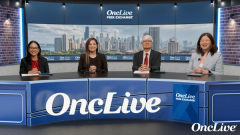
Opinion|Videos|June 25, 2024
ADRIATIC Trial: Durvalumab, cCRT Timing, and Survival in LS-SCLC
Panel experts analyze findings from the phase 3 ADRIATIC trial, examining overall and progression-free survival data, exploring the interaction between durvalumab and concurrent chemoradiotherapy within the tumor microenvironment, and evaluating the impact of time intervals from the completion of concurrent chemoradiotherapy to the initiation of consolidation therapy with a PD-L1 inhibitor.
Advertisement
Episodes in this series

- Please discuss results from the phase 3 ADRIATIC trial, evaluating durvalumab in patients with LS-SCLC who did not have disease progression following concurrent chemoradiotherapy (cCRT) vs placebo after cCRT. (
Spigel D, et al. Plenary Session 2024 ASCO Annual Meeting. LBA5. ) - How might the statistically significant overall survival and progression-free survival outcomes reported in ADRIATIC translate to clinically relevant improvement in life expectancy of your patients with limited-stage SCLC?
- What are the mechanisms by which durvalumab synergizes with concurrent chemoradiotherapy within the tumor microenvironment?
- In patients with LS-SCLC, what would you consider to be a reasonable time interval between completion of cCRT to initiation of consolidation therapy with a PD-L1 inhibitor?
- Please discuss your thoughts on the range of time prior to initiating therapy - from immediately to 6 weeks post-cCRT.
- What is the potential for curative-intent immunotherapy with durvalumab for earlier stages of SCLC?
- What is the role of SBRT in earlier stages of disease vs cCRT followed by durvalumab?
Advertisement
Latest CME
Advertisement
Advertisement
Trending on OncLive
1
Long-Term Cilta-Cel Data Show Low Rates of PFS Events in Standard-Risk R/R Myeloma
2
Single-Center, Retrospective Data Show Low Rate of Lifileucel Infusion Following Referral in Advanced Melanoma
3
Real-World Data Support Clinical Benefit With Lifileucel in Previously Treated Advanced Melanoma
4
Dr Riedell on the Long-Term Efficacy of Tisa-Cel in R/R Follicular Lymphoma
5



































